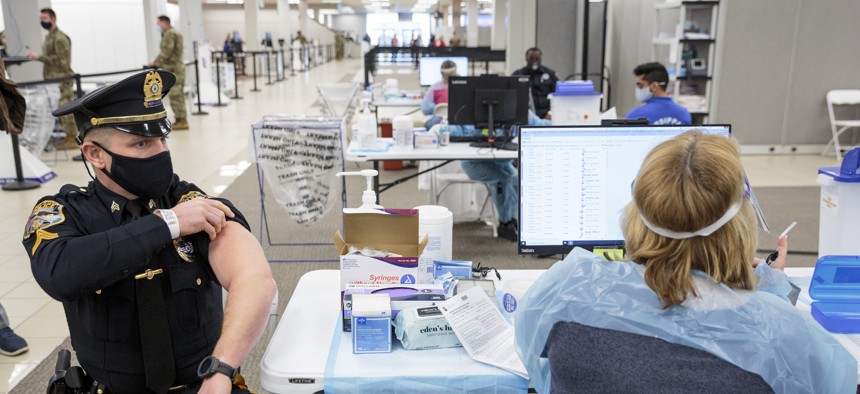States Plan for Large-Scale Coronavirus Vaccinations at Stadiums and Other Sites

Sergeant Michael Zarro, of the Mount Olive, NJ, Police Department, rolls up his sleeve to receive a COVID-19 vaccination at one of the state's two vaccine megasites in Morris County, NJ on Friday, Jan. 8, 2021. Sarah Blesener/The New York Times via AP, Pool
As Covid-19 vaccines become available to broader segments of the public, states are establishing facilities where thousands of doses can be administered daily.
State and local governments are turning huge facilities like sports stadiums and college campuses into large Covid-19 vaccination sites where thousands of people can be inoculated each day, as federal officials said Tuesday they’d begin releasing doses of the vaccine more quickly.
In New Jersey, only health care workers, police officers and firefighters are currently eligible to receive Covid-19 vaccines. But as the state prepares to begin providing shots to a broader pool of people, officials are scaling up New Jersey’s vaccination capacity.
The state opened two of six planned “mega” vaccine sites last week that will have the capacity to vaccinate upwards of 2,000 people a day.
Officials in multiple cities and states across the country have announced similar plans as more coronavirus vaccines become available and they move beyond initial limited vaccine distribution and make the vaccine available to larger segments of the population.
Among the planned locations for New Jersey’s mega sites are a shopping mall and a horse race track. At Rowan College of South Jersey, one of the two megasites to open Friday, only about 1,000 vaccines are administered a week. But when the federal government begins providing the state with larger shipments of the Covid-19 vaccine, that site will have the resources in place to begin mass vaccinations, said Gov. Phil Murphy on Monday as he and state officials toured the facility.
That could happen soon, as U.S. Health and Human Services Secretary Alex Azar announced Tuesday that the Trump administration would stop holding back second doses of the vaccine.
The change in policy came after nine governors wrote to Azar, requesting that the federal government distribute the millions of Covid-19 vaccine doses that the federal government had withheld in order to ensure second doses of the vaccine were available to individuals who had received an initial shot.
Two shots are necessary for maximum effectiveness of the vaccine.
The Trump administration is confident that vaccine manufacturers will be able to ramp up production to meet the demand for second doses, Azar told ABC’s” Good Morning America.”
New Jersey Commissioner of Health Judith Persichilli said the operation of mega sites will be critical to the state’s response to the coronavirus pandemic.
“When the vaccine becomes available, New Jersey will be ready,” she said Monday.
Meanwhile, in California, Gov. Gavin Newsom announced Monday that the state will open mass vaccination sites at Dodger Stadium in Los Angeles, Padres Stadium in San Diego, and Cal Expo in Sacramento County.
Dodger Stadium, which had been used as a coronavirus testing site, will be able to accommodate up to 12,000 people a day, Los Angeles Mayor Eric Garcetti said.
New York City will turn Citi Field into a mega vaccination site that will be operational 24 hours a day, seven days a week by the end of the month, Mayor Bill de Blasio announced Tuesday.
While public officials hope that opening massive vaccine sites will help boost vaccination rates, some are wary of opening too many too soon.
Dallas County, Texas on Monday opened its first mega site at Fair Park, a 277-acre park that hosts the state fair. While officials there expect a total of four or five sites of this sort to be operational, County Judge Clay Jenkins said the county wants to keep operations consolidated initially to ensure all the available vaccine doses are put to use. Vaccine vials contain several doses and once a vial is opened it must be used within about five hours, he said.
“It’s manageable in one place, it gets less manageable the more places you have open,” Jenkins said during a commission meeting last week.
More than 100,000 residents have registered for vaccines in Dallas County. Texas is currently vaccinating people who fall into both its Phase 1a and Phase 1b categories—front-line healthcare workers, residents of long-term care facilities, people over the age of 65, and adults with chronic medical conditions that put them at risk for severe illness.
Many other states have yet to begin vaccinating older adults.
U.S. Centers for Disease Control and Prevention statistics show that as of Monday, federal officials have distributed more than 27 million doses of the vaccine to states and more than 9 million people have received their first dose.
Andrea Noble is a staff correspondent with Route Fifty.
NEXT STORY: An Urban Hospital on the Brink vs. the Officials Sworn to Save It





